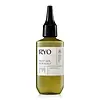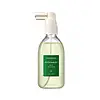What's inside
What's inside
 Key Ingredients
Key Ingredients

 Benefits
Benefits

 Concerns
Concerns

 Ingredients Side-by-side
Ingredients Side-by-side

Water
Skin ConditioningAlcohol Denat.
AntimicrobialSilica
AbrasiveCamellia Sinensis Leaf Extract
AntimicrobialChamomilla Recutita Flower Water
MaskingCarbomer
Emulsion StabilisingTromethamine
BufferingGlycerin
HumectantParfum
MaskingMenthol
MaskingDisodium EDTA
Limonene
PerfumingButylene Glycol
HumectantPiroctone Olamine
PreservativePropanediol
SolventPanax Ginseng Root Cell Extract
Skin Conditioning1,2-Hexanediol
Skin ConditioningCamellia Japonica Seed Oil
EmollientCamellia Sinensis Seed Oil
HumectantGlycine Max Polypeptide
Skin ConditioningLavandula Angustifolia Oil
MaskingRosmarinus Officinalis Leaf Oil
MaskingCitrus Aurantium Bergamia Fruit Oil
MaskingZingiber Officinale Root Extract
MaskingCamellia Japonica Flower Extract
EmollientPanax Ginseng Extract
AntioxidantRosa Damascena Flower Extract
MaskingCentella Asiatica Flower/Leaf/Stem Extract
Skin ConditioningEthylhexylglycerin
Skin ConditioningGlycine Max Oil
EmollientGlycine Max Seed Extract
Skin ConditioningCeramide NP
Skin ConditioningPhytosphingosine
Skin ConditioningHydrogenated Lecithin
EmulsifyingCanola Oil
EmollientRosmarinus Officinalis Leaf Extract
AntimicrobialWater, Alcohol Denat., Silica, Camellia Sinensis Leaf Extract, Chamomilla Recutita Flower Water, Carbomer, Tromethamine, Glycerin, Parfum, Menthol, Disodium EDTA, Limonene, Butylene Glycol, Piroctone Olamine, Propanediol, Panax Ginseng Root Cell Extract, 1,2-Hexanediol, Camellia Japonica Seed Oil, Camellia Sinensis Seed Oil, Glycine Max Polypeptide, Lavandula Angustifolia Oil, Rosmarinus Officinalis Leaf Oil, Citrus Aurantium Bergamia Fruit Oil, Zingiber Officinale Root Extract, Camellia Japonica Flower Extract, Panax Ginseng Extract, Rosa Damascena Flower Extract, Centella Asiatica Flower/Leaf/Stem Extract, Ethylhexylglycerin, Glycine Max Oil, Glycine Max Seed Extract, Ceramide NP, Phytosphingosine, Hydrogenated Lecithin, Canola Oil, Rosmarinus Officinalis Leaf Extract
Alcohol Denat.
AntimicrobialRosmarinus Officinalis Leaf Extract
AntimicrobialPinus Densiflora Leaf Extract
AntimicrobialWater
Skin ConditioningRosmarinus Officinalis Leaf Oil
MaskingZingiber Officinale Root Extract
MaskingBifida Ferment Lysate
Skin ConditioningLactobacillus Ferment Lysate
Skin ConditioningCaffeine
Skin ConditioningPanthenol
Skin ConditioningBiotin
AntiseborrhoeicThiamine Hcl
MaskingPyridoxine Hcl
Skin ConditioningAscorbic Acid
AntioxidantMenadione
MaskingRiboflavin
Cosmetic ColorantOryza Sativa Extract
AbsorbentGlycine Soja Seed Extract
Skin ConditioningSesamum Indicum Seed Extract
Skin ConditioningSolanum Melongena Fruit Extract
Skin ConditioningMorus Alba Fruit Extract
AntioxidantPiper Nigrum Seed Extract
RefreshingSalicylic Acid
MaskingLavandula Angustifolia Oil
MaskingMenthol
MaskingGlycerin
HumectantEthylhexylglycerin
Skin ConditioningCitrus Aurantium Dulcis Peel Oil
MaskingMentha Viridis Leaf Oil
AstringentMelia Azadirachta Leaf Extract
Skin ConditioningMelia Azadirachta Flower Extract
Skin ConditioningGeraniol
PerfumingLimonene
PerfumingLinalool
Perfuming1,2-Hexanediol
Skin ConditioningBenzyl Glycol
SolventAlcohol Denat., Rosmarinus Officinalis Leaf Extract, Pinus Densiflora Leaf Extract, Water, Rosmarinus Officinalis Leaf Oil, Zingiber Officinale Root Extract, Bifida Ferment Lysate, Lactobacillus Ferment Lysate, Caffeine, Panthenol, Biotin, Thiamine Hcl, Pyridoxine Hcl, Ascorbic Acid, Menadione, Riboflavin, Oryza Sativa Extract, Glycine Soja Seed Extract, Sesamum Indicum Seed Extract, Solanum Melongena Fruit Extract, Morus Alba Fruit Extract, Piper Nigrum Seed Extract, Salicylic Acid, Lavandula Angustifolia Oil, Menthol, Glycerin, Ethylhexylglycerin, Citrus Aurantium Dulcis Peel Oil, Mentha Viridis Leaf Oil, Melia Azadirachta Leaf Extract, Melia Azadirachta Flower Extract, Geraniol, Limonene, Linalool, 1,2-Hexanediol, Benzyl Glycol
 Reviews
Reviews

Alternatives
Ingredients Explained
These ingredients are found in both products.
Ingredients higher up in an ingredient list are typically present in a larger amount.
1,2-Hexanediol is a synthetic liquid and another multi-functional powerhouse.
It is a:
- Humectant, drawing moisture into the skin
- Emollient, helping to soften skin
- Solvent, dispersing and stabilizing formulas
- Preservative booster, enhancing the antimicrobial activity of other preservatives
Alcohol Denat. is an alcohol with a denaturant property. It is created by mixing ethanol with other additives.
This ingredient gets a bad rep because it is irritating and drying - mostly due to its astringent property. Astringents draw out natural oils in tissue, constricting pores and leaving your skin dried out.
However, alcohol denat. is not all that bad.
Due to its low molecular weight, alcohol denat. tends to evaporate quickly. One study on pig skin found half of applied alcohol evaporated in 10 seconds and less than 3% stayed on skin.
This also helps other ingredients become better absorbed upon application.
Studies are conflicted about whether this ingredient causes skin dehydration. One study from 2005 found adding emollients to propanol-based sanitizer decreased skin dryness and irritation. Another study found irritation only occurs if your skin is already damaged.
Small amounts of alcohol are generally tolerated by oily skin or people who live in humid environments.
The rule of thumb is if this alcohol is near the end of an ingredients list, it will probably not affect your skin much.
Also...
This ingredient has antimicrobial and solvent properties.
The antimicrobial property helps preserve products and increase their shelf life. As a solvent, it helps dissolve other ingredients.
Other types of astringent alcohols include:
Learn more about Alcohol Denat.Ethylhexylglycerin (we can't pronounce this either) is commonly used as a preservative and skin softener. It is derived from glyceryl.
You might see Ethylhexylglycerin often paired with other preservatives such as phenoxyethanol. Ethylhexylglycerin has been found to increase the effectiveness of these other preservatives.
Glycerin is already naturally found in your skin. It helps moisturize and protect your skin.
A study from 2016 found glycerin to be more effective as a humectant than AHAs and hyaluronic acid.
As a humectant, it helps the skin stay hydrated by pulling moisture to your skin. The low molecular weight of glycerin allows it to pull moisture into the deeper layers of your skin.
Hydrated skin improves your skin barrier; Your skin barrier helps protect against irritants and bacteria.
Glycerin has also been found to have antimicrobial and antiviral properties. Due to these properties, glycerin is often used in wound and burn treatments.
In cosmetics, glycerin is usually derived from plants such as soybean or palm. However, it can also be sourced from animals, such as tallow or animal fat.
This ingredient is organic, colorless, odorless, and non-toxic.
Glycerin is the name for this ingredient in American English. British English uses Glycerol/Glycerine.
Learn more about GlycerinLavandula Angustifolia Oil is more commonly known as lavender essential oil. It is considered a fragrancing ingredient.
Lavender imparts a famous scent. While the smell is lovely, this ingredient and may sensitize skin in topical products. This is because about 85% of the oil is made up of linalool and linalyl acetate.
When exposed to air, these two compounds become strong allergens. This ingredient exhibits cytotoxicity at low concentrations; amounts of 0.25% have been shown to damage skin cells.
A study from Japan found this ingredient caused lavender sensitivity after widespread exposure.
Lavender essential oil has some antimicrobial, antibacterial, and anti-inflammatory properties. However, the cons of this ingredient may outweight the pros.
More research is needed to confirm lavender essential oil's effects when used in aromatherapy.
Lavandula Angustifolia is known as the English Lavender and famous for creating purple fields in Provence, France.
Learn more about Lavandula Angustifolia OilLimonene is a fragrance that adds scent and taste to a formulation.
It's found in the peel oil of citrus fruits and other plants such as lavender and eucalyptus. The scent of limonene is generally described as "sweet citrus".
Limonene acts as an antioxidant, meaning it helps neutralize free radicals.
When exposed to air, oxidized limonene may sensitize the skin. Because of this, limonene is often avoided by people with sensitive skin.
The term 'fragrance' is not regulated in many countries. In many cases, it is up to the brand to define this term. For instance, many brands choose to label themselves as "fragrance-free" because they are not using synthetic fragrances. However, their products may still contain ingredients such as essential oils that are considered a fragrance.
Learn more about LimoneneMenthol is a compound found in mint plants, such as peppermint. In its pure form, it is a clear crystalline substance.
Menthol is known for its cooling sensation; however, the cooling is actually from your skin being sensitized. Menthol can worsen rosacea. We recommend speaking with a professional if you have concerns.
Menthol also has antimicrobial properties.
Learn more about MentholRosmarinus Officinalis Leaf Extract comes from rosemary. Rosemary is native to the Mediterranean.
While Rosmarinus Officinalis Leaf Oil can be volatile due to its fragrant properties, the fragrance components are usually removed in the leaf extract.
Rosemary Leaf Extract contains many antioxidants such as rosmarinic acid and caffeic acid. Rosemarinic acid, a compound found in rosemary leaf, has been found to help soothe skin conditions such as eczema and acne.
Learn more about Rosmarinus Officinalis Leaf ExtractRosmarinus Officinalis Leaf Oil is oil expressed from the leaves of the rosemary plant.
Rosemary Leaf Oil is a fragrance and helps give your product a scent. If you are sensitive to irritating fragrances, this one contains camphor. Camphor has been found to irritate skin.
This oil also contains antioxidant and antimicrobial properties. As an antioxidant, it may protect you skin against damage. This can help slow down the signs of aging.
Learn more about Rosmarinus Officinalis Leaf OilWater. It's the most common cosmetic ingredient of all. You'll usually see it at the top of ingredient lists, meaning that it makes up the largest part of the product.
So why is it so popular? Water most often acts as a solvent - this means that it helps dissolve other ingredients into the formulation.
You'll also recognize water as that liquid we all need to stay alive. If you see this, drink a glass of water. Stay hydrated!
Learn more about WaterZingiber Officinale is more commonly known as ginger.
Ginger root has antioxidant, anti-inflammation, and antimicrobial properties.
The antioxidant properties help protect your body from free-radicals. Free-radicals are molecules that may damage your skin cells. As a result, ginger may help slow down signs of aging such as hyperpigmentation and wrinkles.
Studies show ginger inhibits the enzyme that breaks down collagen. It also helps with:
This ingredient has no negative side-effects and is safe to use unless one has a specific allergy to it.
Ginger originates from Southeast Asia but has spread throughout the world. It is now a common spice used in many cultures.
Learn more about Zingiber Officinale Root Extract